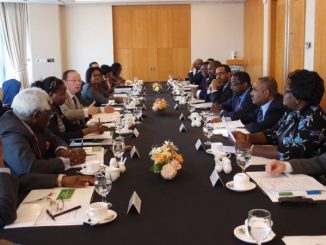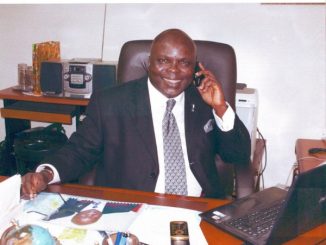By Karamoh Kabba
Some have argued that, like Nevada of the United States, great economic deserts in Africa may disappear with a strong federation and robust economic activities in a United States of Africa. The greatest question is, are African leaders prepared to shake off believing that united Africa is impossibility? If that is the case, a realization amongst African leaders must have set in on Kwame Nkrumah’s 1963 vision: “I have often been accused of pursuing a policy of the impossible. But I cannot believe in the impossibility of achieving African union . . . Africa must unite. We have before us not only an opportunity but an historic duty.”
Nkrumah’s vision may have been delayed for over fifty odd years for many reasons not unconnected to African leaders’ desire to stay in power forever. Is Africa, therefore, witnessing the making of an all-Africa dictator of an internationally known autocrat, with squint-eyed view on united Africa for a larger throne? Or is this an awakening of Gaddafi’s failed attempt to have greater power in Africa through rebellious movements now cloaked in all-African diplomacy?
The fact remains that Gadaffi supported Charles Taylor and Foday Sanchoh’s rebel wars in Sierra Leone and Liberia that left over 500,000 thousand dead and thousands more limbless in both countries. Taylor is now on trial in The Hague for alleged crimes against humanity in the civil wars and Foday Sankoh died in the custody of the Special Court of Sierra Leone while awaiting trial for alleged crimes against humanity. Intriguingly, Gaddafi is traversing in huge entourage complete with heavy bodyguard across the wide African plains and Savannah grasslands, peddling his all-African Agenda.
His sponsored rebellion in the region was through the very poorest nations along that west coast of Africa—Sierra Leone and Liberia. But he is now wooing their post-war leaders who have managed to carry on in fledgling democracies for support of his newfound diplomatic cause for a United States of Africa.
In Sierra Leone, he stated how disturbing it is to see Africans dying to cross into Europe in boats. He stated that the only place for Africans is Africa – Africans should not run away but to stay and tough it out in a united Africa.
“What is next on Sierra Leone leaders’ agenda?” a Sierra Leonean youth residing in the United Sates since 1999 after losing two of his siblings in the civil war asked his friend, another immigrant because of the same reason. With an inflection compounded by an outburst of laughter replied, “Maybe the erection of a statue of Colonel Mohamarr al-Gadaffi, all stuck-up, across the street facing the Special Court of Sierra Leone, with a stuck out middle finger.”
The Special Court of Sierra Leone is a hybrid court set up by the government of Sierra Leone and the United Nation to bring to book those who bear the greatest responsibility for crimes against humanity in Sierra Leone during its civil war. And it seems Gaddafi is making an unintended mockery of the institution according to the sentiments that are being expressed by some Sierra Leoneans both in Sierra Leone and abroad. One social commentator, in a reply to a question from a concerned citizen who asked why are the people coming out in throng to welcome Gaddiffi, answered, “What do these people know about his [Gadaffi] connection to the civil war?”
But for the center to hold for a true united Africa, it must come from leaders who have manifested strong willingness to support and govern their people by good democratic and human rights principles. Ghana, the birth place of Nkrumah’s united Africa vision has been making great democratic steps since Jerry John Rawlings reversed what had seemed like a failed state before his two times military coup and transfer of power to a civilian government through the voice of the citizens.
With the knowledge of the atrocities committed by Charles Taylor and late Foday Sanchoh’s misguided rebels that were notorious for the hacking off of limbs of their victims akin to King Leopold’s Congo Free State, a concerned citizen called Gadaffi’s visit to that nation, “an affront to the people,” comparing it to the erection of King Leopold’s statue on a horse back in the heartland of Congo.
If Libya is dead serious about a democratically united Africa, it should be working behind the curtain with countries like South Africa, Botswana, and Ghana, maybe Nigeria etc., that can boast of some democratic feats under their belts, and stand behind them in public. This is because according to what many are saying, Africa may be in need of strong unity, but certainly not a colonel at the head in such a looming newfound political dispensation.



